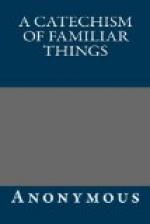Blanched, whitened.
Of what is Paper made?
Of linen and cotton rags beaten to a pulp in water; also from straw, wood, and many plants.
What materials were used for writing, before the invention of Paper?
Various were the materials on which mankind in different ages and countries contrived to write: stones, bricks, the leaves of herbs and trees, and their rinds or barks; tablets of wood, wax, and ivory; plates of lead, silk, linen rolls, &c. At length the Egyptian paper made of the papyrus, was invented; then parchment; and lastly, paper manufactured of cotton or linen rags. There are few sorts of plants which have not at some time been used for paper and books. In Ceylon, for instance, the leaves of the talipot; in India, the leaves of the palm (with which they commonly covered their houses,) were used for books. In the East Indies, the leaves of the plantain tree, dried in the sun, were used for the same purpose. In China, paper is made of the inner bark of the mulberry, the bamboo, the elm, the cotton, and other trees.
What is Papyrus?
A large rush, chiefly growing in Egypt, on the banks of the Nile. The ancient Egyptians made sails, ropes, mats, blankets, and canvas, of the stalks and fibres of the papyrus. Their priests also wore shoes made of it; and even sugar was extracted from this plant. Moses, the deliverer raised by God to rescue the Israelites from the bondage of Egypt, was exposed to the Nile in a basket of papyrus. The plant is now, however, exceedingly scarce.
Where was the first Paper Mill erected in England?
At Dartford, by a German named Spilman, in 1588. The only sort made, however, was the coarse brown; and it was not till 1690, when the French protestant refugees settled in England, that their own paper-makers began to make white writing and printing paper. The manufacture has been brought to great perfection, both for beauty and substance, in England and the United States.
Protestant, a name given in Germany to those who adhered to the doctrines of the apostate monk, Martin Luther, because they protested against a decree of Charles V. and applied to a general council.
Refugee, from refuge, a place of safety from danger; an asylum. Here it more particularly means those French Protestants who quit their homes and sought other countries, after the revocation of the Edict of Nantes, which deprived them of their religious liberty.
[Illustration: THE DOME OF PISA, ITALY; WITH THE FAMOUS LEANING TOWER, IN THE DISTANCE.]
Is it known to whom we are indebted for the invention of Linen Paper?
Not exactly. It has long been disputed among the learned when, and by whom, it was invented; some authors say it was discovered by the Germans, others by the Italians; others ascribe it to some refugee Greeks at Basil, who took the idea from the making of cotton paper in their own country; some, that the Arabs first introduced it into Europe. Perhaps the Chinese have the best title to the invention, inasmuch as they have for many ages made paper, and in some provinces of the same materials as are now used by us in its manufacture.




